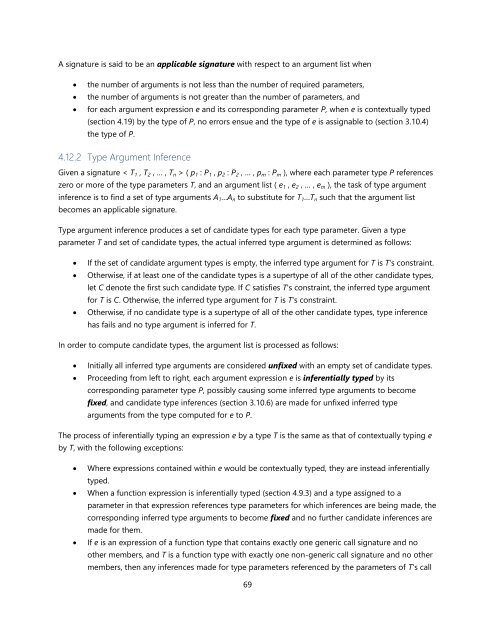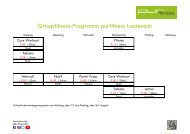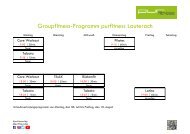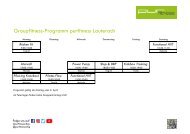TypeScript Language Specification v1.5
TypeScript Language Specification v1.5
TypeScript Language Specification v1.5
Create successful ePaper yourself
Turn your PDF publications into a flip-book with our unique Google optimized e-Paper software.
A signature is said to be an applicable signature with respect to an argument list when<br />
<br />
<br />
<br />
the number of arguments is not less than the number of required parameters,<br />
the number of arguments is not greater than the number of parameters, and<br />
for each argument expression e and its corresponding parameter P, when e is contextually typed<br />
(section 4.19) by the type of P, no errors ensue and the type of e is assignable to (section 3.10.4)<br />
the type of P.<br />
4.12.2 Type Argument Inference<br />
Given a signature < T 1 , T 2 , … , T n > ( p 1 : P 1 , p 2 : P 2 , … , p m : P m ), where each parameter type P references<br />
zero or more of the type parameters T, and an argument list ( e 1 , e 2 , … , e m ), the task of type argument<br />
inference is to find a set of type arguments A 1 …A n to substitute for T 1 …T n such that the argument list<br />
becomes an applicable signature.<br />
Type argument inference produces a set of candidate types for each type parameter. Given a type<br />
parameter T and set of candidate types, the actual inferred type argument is determined as follows:<br />
<br />
<br />
<br />
If the set of candidate argument types is empty, the inferred type argument for T is T's constraint.<br />
Otherwise, if at least one of the candidate types is a supertype of all of the other candidate types,<br />
let C denote the first such candidate type. If C satisfies T's constraint, the inferred type argument<br />
for T is C. Otherwise, the inferred type argument for T is T's constraint.<br />
Otherwise, if no candidate type is a supertype of all of the other candidate types, type inference<br />
has fails and no type argument is inferred for T.<br />
In order to compute candidate types, the argument list is processed as follows:<br />
<br />
<br />
Initially all inferred type arguments are considered unfixed with an empty set of candidate types.<br />
Proceeding from left to right, each argument expression e is inferentially typed by its<br />
corresponding parameter type P, possibly causing some inferred type arguments to become<br />
fixed, and candidate type inferences (section 3.10.6) are made for unfixed inferred type<br />
arguments from the type computed for e to P.<br />
The process of inferentially typing an expression e by a type T is the same as that of contextually typing e<br />
by T, with the following exceptions:<br />
<br />
<br />
<br />
Where expressions contained within e would be contextually typed, they are instead inferentially<br />
typed.<br />
When a function expression is inferentially typed (section 4.9.3) and a type assigned to a<br />
parameter in that expression references type parameters for which inferences are being made, the<br />
corresponding inferred type arguments to become fixed and no further candidate inferences are<br />
made for them.<br />
If e is an expression of a function type that contains exactly one generic call signature and no<br />
other members, and T is a function type with exactly one non-generic call signature and no other<br />
members, then any inferences made for type parameters referenced by the parameters of T's call<br />
69


















